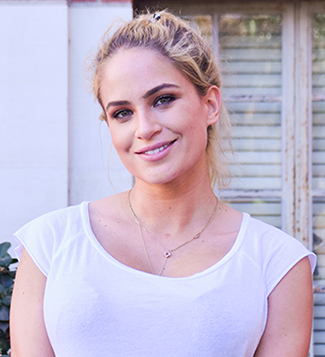
Aleksandra Visser
Aleksandra Visser started out as an aspiring cellist. Now, she’s researching Holocaust survivors for USC Shoah Foundation’s New Dimensions in Testimony project.
Visser majored in music performance as an undergraduate at USC – she started studying cello at age seven – but when she realized she didn’t want to be a professional cellist, she decided to return to USC for a second bachelor’s degree in history.
Her attention soon turned to the Soviet Union during World War II, and after she graduated in 2013, Wolf Gruner, director of the USC Shoah Foundation Center for Advanced Genocide Research, hired her as his research assistant.
Visser started out researching and transcribing testimonies of Czech Holocaust survivors in the Visual History Archive for Gruner and then transitioned into helping then-USC Shoah Foundation Associate Director of Research Dan Leshem and Project Specialist Kia Hays plan the Institute’s 2014 Through Testimony International Conference.
Now, her work has transitioned into working on USC Shoah Foundation’s New Dimensions in Testimony (NDT) project, in which Holocaust survivors answer hundreds of questions about their lives while being filmed on a 3D-capture stage. Voice recognition technology will enable audiences to have a conversation with the survivor’s 3D virtual likeness in real time. Visser is responsible for thoroughly researching each survivor before his or her interview so the NDT team can develop the appropriate interview questions.
Visser said she watches every testimony and interview the survivor has done and reads all their books and memoirs in order to get a detailed understanding of their life story. She and the NDT team joke that by the end of her research, she knows more about the survivor than his or her family does.
Over the course of her research, Visser said she’s noticed some interesting themes among the survivors. For example, the survivors from Western European countries like the Netherlands received much better treatment from their non-Jewish communities upon their return home after the war than survivors did in Hungary and Czechoslovakia. Also, the amount of family support a survivor had after liberation seems to have affected not only their immediate post-war life, but also their attitude toward the Holocaust even decades later.
“Even if they lost their family, if they had a lot of love around them or were adopted by a loving family, or one of their relatives lived so they still felt they had some sense of home, they just had a different outlook on the whole experience,” Visser said. “It influenced how they felt about what happened to them and who they became as a person.”
Visser said going to all the NDT filming sessions and being able to interact with the survivors one-on-one has been one of the most rewarding experiences of her life. Despite the grueling five-day interview process, each survivor is grateful to USC Shoah Foundation for giving them the opportunity to be part of NDT.
“It’s been extremely rewarding to see how brave they are in going through [the interview],” she said. “Just getting to know them as people has been really exciting.”
Eventually, Visser would like to return to school for her PhD in history, focusing on the Holocaust on the eastern front, specifically sexual violence perpetrated by local police forces. Her interest in this topic was actually sparked by the Visual History Archive, she said, after she stumbled upon testimonies that made her want to pursue this under-researched subject.
She finds NDT and the Visual History Archive special because they obtain the survivors’ raw, authentic responses to questions about the most traumatic events of their lives. Nowhere else can you find such emotional and unfiltered testimony from Holocaust survivors, Visser said.
But, she admits she hasn’t had time to reflect much on the impact her work with NDT will one day have on future generations, who will be able to interact with Holocaust survivors long after the survivors are no longer living. There’s still too much to be done.
“I’m looking forward to when I can take a step back and say, ‘Wow, we did this,’” Visser said.